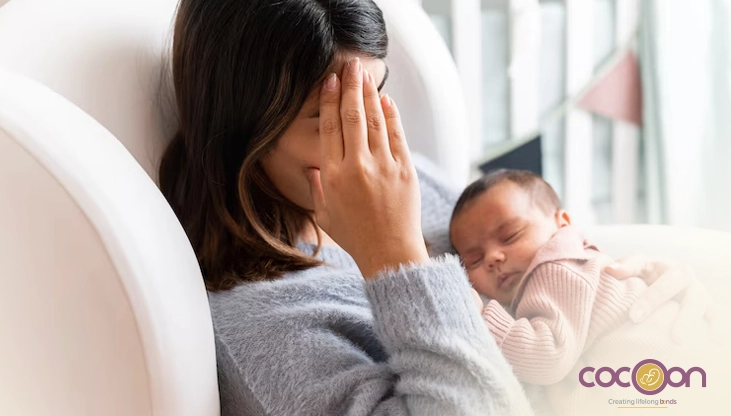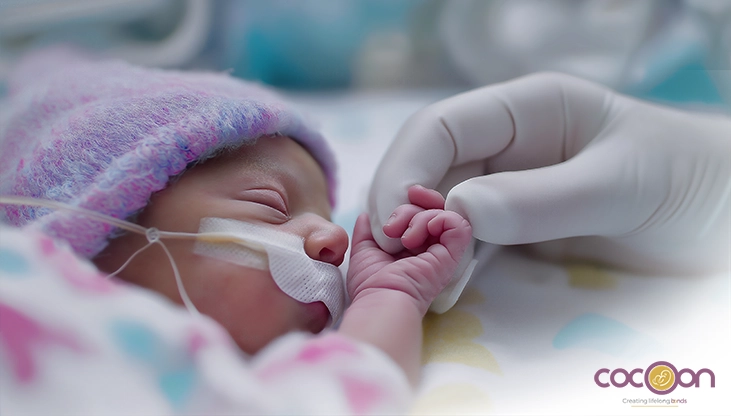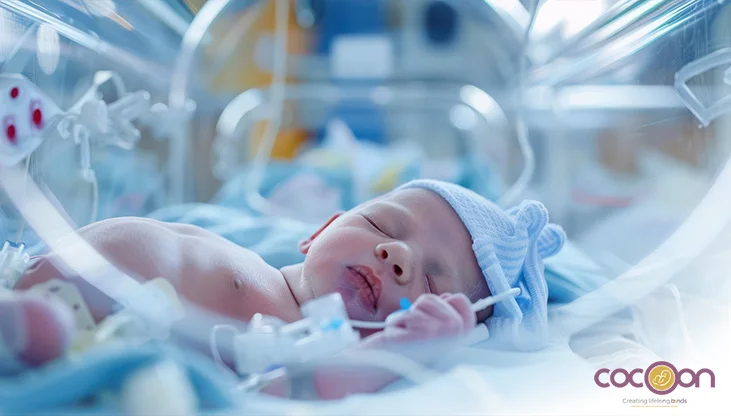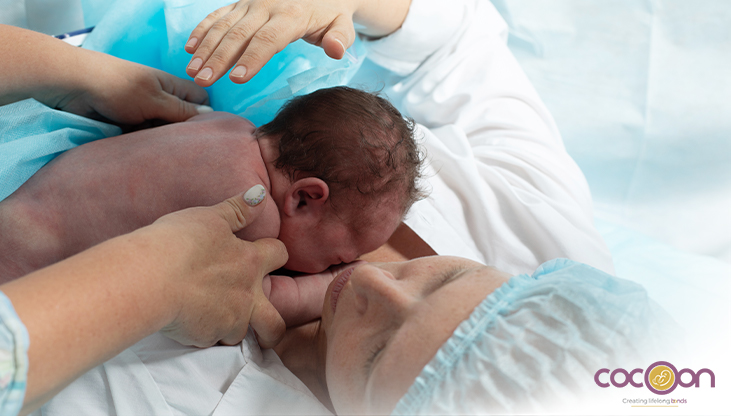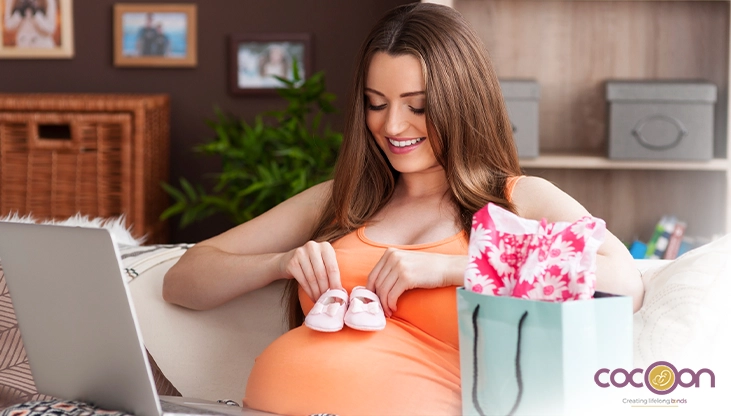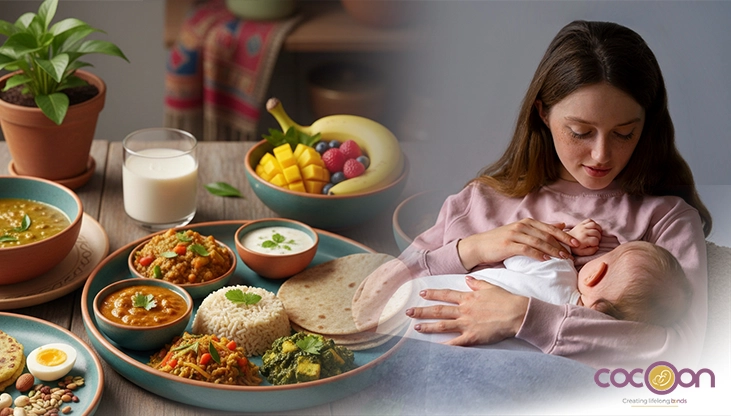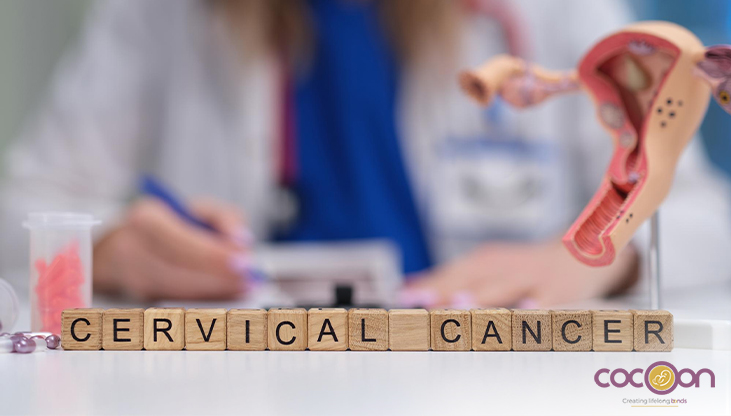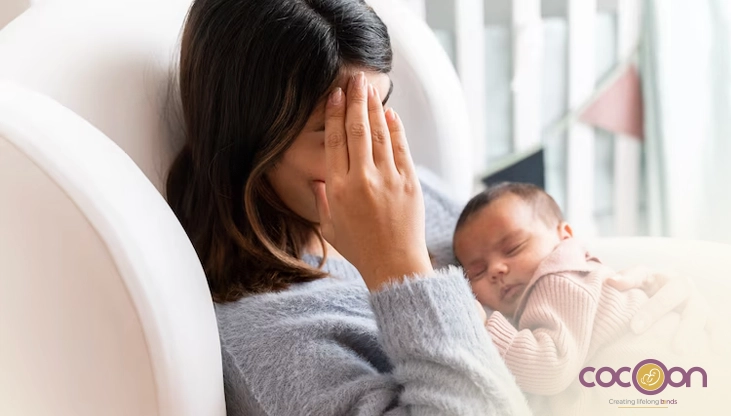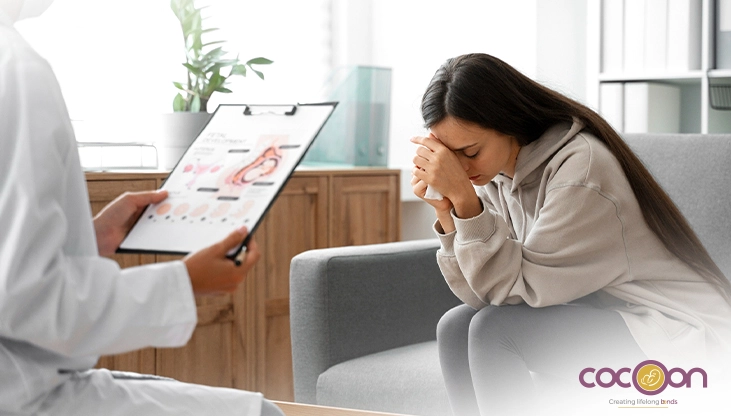You may have heard in many conversations, women say they didn’t feel connected to their babies immediately after the delivery. And it is true, and it is more common than you think, and it can be a sign of Postpartum Depression (PPD). During pregnancy and after delivery, a woman’s body and hormones go through drastic changes, causing mood swings, sadness, or even feeling distant from the baby.
It’s important to remember not to judge this as a sign of weakness or being a bad mother. All she needs is emotional support from family, open conversations, and recovery guidance from a doctor or therapist.
Guide to Postnatal Wellness: Diet, Exercise & Mental Health
What is Postpartum Depression (PPD)
Postpartum depression (PPD) is a type of depression. It affects many women after childbirth, leading to prolonged sadness, anxiety, and fatigue. PPD can interfere with daily life and bonding with the baby. It can last for months or even years after the delivery.
Note: Postpartum depression is now included in the term perinatal depression.
Antenatal and Postnatal Wellness: The Key to Healthy Motherhood
What Postpartum Depression Feels Like | The Symptoms
Women can experience the following symptoms:
A. Emotional and mental symptoms
- Excessive sadness
- Low mood
- Intense anxiety and worry, constantly about the baby’s safety
- Mood swings
- Uncontrollable crying spells
- Feeling irritable, angry, or restless
- Thoughts of harming the baby (rare but serious)
- Self-harming thoughts (rare but serious)
- Social withdrawal from family and friends
B. Physical and behavioral symptoms
- Extreme fatigue
- Lack of energy
- Difficulty sleeping
- Sleeping too much
- Loss of interest in usual activities
- Difficulty bonding with the baby or feeling disconnected
- Feelings of guilt, shame or worthlessness
- Not able to concentrate or make quick decisions
Why it Happens
The exact cause is not fully understood; however, it can happen due to multiple reasons, like:
- A sudden decrease in pregnancy hormones like estrogen and progesterone after delivery.
- Changes in mood-regulating brain chemicals like serotonin (a happy hormone) and GABA (which produces a calming effect).
- Stress and exhaustion from parenting a newborn.
- Sleep deprivation
- A family history of depression
- Psychological factors like past depression, anxiety, or trauma
- Social factors such as lack of support, relationship issues, or financial stress
- Physical factors like difficulty during childbirth or a challenging pregnancy journey
- Disturbances in the stress hormone system (i.e., the HPA axis) leading to poor stress responses
- Nutritional deficiencies due to poor financial condition and lifestyle factors like poor diet and lack of exercise
- Neuroinflammation in the brain
How Common is PPD?
It is common, and globally it is estimated to affect 10 to 30% of women. In India, about 22% of mothers suffer from postpartum depression. In some regions, PPD can affect 1 in 5 women.
Can PPD Recover on Its Own
In mild cases, it can recover naturally but needs strong social support from family and friends. But moderate and severe cases require medical attention.
What are the Support & Recovery Tips for Postpartum Depression
Here are the recovery tips:
1. Seek Medical Support & Help Early
Visit the doctor if you observe the signs and symptoms of PPD for timely treatment.
2. Psychological Counseling
Take therapy such as cognitive-behavioral therapy (CBT) or interpersonal therapy. This helps manage negative thoughts and handle extreme emotions in a better way.
3. Prescribed Medication
If prescribed, take your antidepressants to rebalance brain chemicals. Newer drugs like brexanolone or zuranolone are showing potential for faster relief under medical supervision.
4. Have a Support System
Do not isolate yourself. Stay in touch with family, friends, or support groups to help navigate your feelings.
5. Prioritize Self-care
In the chaos of childcare, do not forget to care for yourself. Here are the self-care tips:
- Prioritize rest
- Journaling
- Read books
- Healthy nutrition
- Gentle exercise
- Engage in activities that bring joy and relaxation.
6. Maintain Your Sleep Quality
Sleep is the time when the body performs tissue growth and repair. Hence, aim for good sleep hygiene or ask for assistance with baby care to improve rest.
7. Do Not Self-blame or Feel Worthless
Understand that PPD is a common medical condition, and it's not a personal weakness. Hence, stop feeling worthless, especially after carrying a baby with full strength.
8. Educate Yourself
Knowledge and awareness are the best keys to reducing fear and stigma around PPD. Hence, read related books or posts to get the right tips.
9. Keep Follow-ups
Continue treatment until your doctor instructs you to stop them to prevent relapse and ensure full recovery.
To Summarize
Pregnancy is a challenging journey, but the real challenge starts after childbirth. Most women become so consumed by their new roles that they forget they need care too. That's why sometimes, conditions like postpartum depression go unnoticed until they become severe. Therefore, women need to care for themselves and seek timely help to prevent complications.
FAQs
Q1: How long does postpartum depression last?
A: PPD can last from a few months up to a year or longer if ignored. Some women may have symptoms persisting for several years without care. Thankfully, early treatment under a doctor’s guidance helps shorten the duration and improve recovery.
Q2: Can postpartum depression affect my baby?
A: Yes, untreated PPD can interfere with the bonding of the mother with the baby. The baby's emotional, social, and cognitive development can be affected. Hence, early diagnosis and treatment are necessary to protect both the mother's and the child's well-being.
Q3: What are the 4 stages of PPD?
A: Here are the 4 stages of PPD:
- Encountering terror
- Dying of self
- Struggling to survive
- Regaining control
Q4. What is the 5 5 5 rule postpartum?
A: This rule is the simple guidance for new mothers to heal physically and emotionally in 3 stages:
- First 5 days: Rest in your bed and emphasize timely skin-to-skin contact and breastfeeding with your baby.
- Next 5 days: Sit up in bed, keep on bonding, and engage in light activities such as reading or playing with older children.
- Final 5 days: perform more light tasks; however, avoid standing for 30 minutes at a single stretch.

